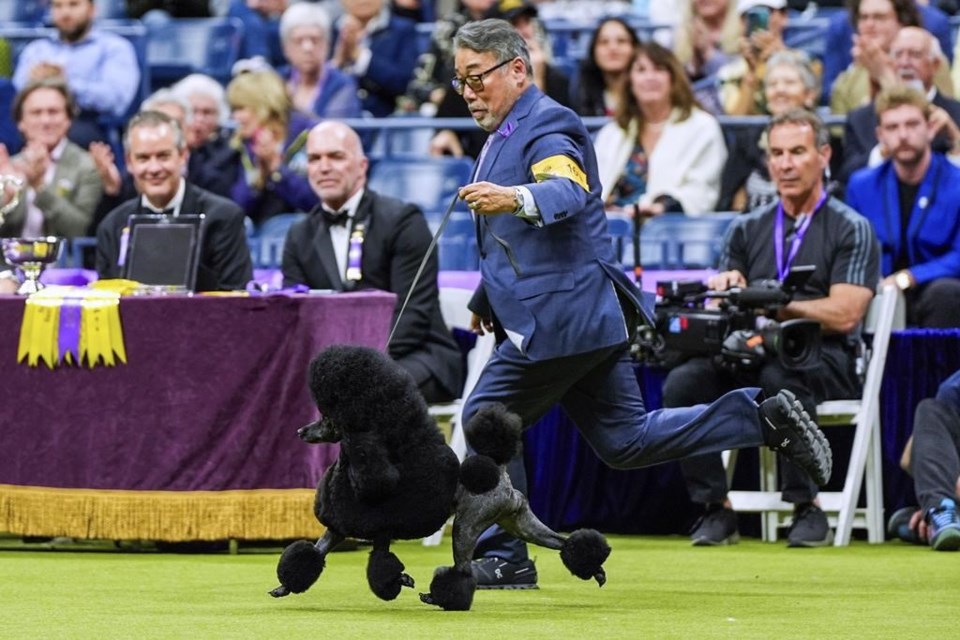NEW YORK (AP) — For a last hurrah, it was a Sage decision.
A miniature poodle named Sage won the top prize Tuesday night at the Westminster Kennel Club dog show, in what veteran handler Kaz Hosaka said would be his final time at the United States' most prestigious canine event. After 45 years of competing and two best in show dogs, he plans to retire.
Sage notched the 11th triumph for poodles of various sizes at Westminster; only wire fox terriers have won more. The last miniature poodle to take the trophy was Spice, with Hosaka, in 2002.
“No words,” he said in the ring to describe his reaction to Sage’s win before supplying a few: “So happy — exciting.”
Striding briskly and proudly around the ring, the inky-black poodle “gave a great performance for me,” Hosaka added.
Sage bested six other finalists to take best in show. Second went to Mercedes, a German shepherd whose handler, Kent Boyles, also has shepherded a best in show winner before.
Others in the final round included Comet, a shih tzu who won the big American Kennel Club National Championship last year; Monty, a giant schnauzer who arrived at Westminster as the nation’s top-ranked dog and was a Westminster finalist last year; Louis, an Afghan hound; Micah, a black cocker spaniel; and Frankie, a colored bull terrier.
While Sage was going around the ring, a protester carrying a sign urging people to “boycott breeders” tried to climb in and was quickly intercepted by security personnel. Police and the animal rights group PETA said three demonstrators were arrested. Charges have not yet been decided.
In an event where all competitors are champions in dog showing's point system, winning can depend on subtleties and a standout turn at the USTA Billie Jean King National Tennis Center, home of the U.S. Open tennis tournament.
The final lineup was “excellent, glorious,” best in show judge Rosalind Kramer said.
To Monty’s handler and co-owner, Katie Bernardin, "just to be in the ring with everyone else is an honor.”
“We all love our dogs. We’re trying our best," she said in the ring after Monty's semifinal win. “A stallion” of a dog, he's solid, powerful and “very spirited," said Bernardin of Chaplin, Connecticut.
So spirited that while Bernardin was pregnant, she did obedience and other dog sports with Monty because he needed the stimulation.
Dogs first compete against others of their breed. Then the winner of each breed goes up against others in its “group.” The seven group winners meet in the final round.
The best in show winner gets a trophy and a place in dog-world history, but no cash prize.
Besides the winners, there were other dogs that were hits with the crowd. A lagotto Romagnolo named Harry earned a chuckle from the stadium audience by sitting up and begging for a treat from his handler, and a vizsla named Fletcher charmed spectators by jumping up on its handler after finishing a spin around the ring.
There were big cheers, too, for a playful great Pyrenees called Sebastian and a Doberman pinscher named Emilio.
Other dogs that vied in vain for a spot in the finals included Stache, a Sealyham terrier. He won the National Dog Show that was televised on Thanksgiving and took top prize at a big terrier show in Pennsylvania last fall.
Stache showcases a rare breed that’s considered vulnerable to extinction even in its native Britain.
“They’re a little-known treasure,” said Stache’s co-owner, co-breeder and handler, Margery Good of Cochranville, Pennsylvania, who has bred “Sealys” for half a century. Originally developed in Wales to hunt badgers and other burrowing game, the terriers with a “fall” of hair over their eyes are courageous but comedic — Good dubs them “silly hams.”
Westminster can feel like a study in canine contrasts. Just walking around, a visitor could see a Chihuahua peering out of a carrying bag at a stocky Neapolitan mastiff, a ring full of honey-colored golden retrievers beside a lineup of stark-black giant schnauzers, and handlers with dogs far larger than themselves.
Shane Jichetti was one of them. Ralphie, the 175-pound (34-kg) great Dane she co-owns, outweighs her by a lot. It takes considerable experience to show so big an animal, but “if you have a bond with your dog, and you just go with it, it works out,” she said.
Plus Ralphie, for all his size, is “so chill,” said Jichetti. Playful at home on New York's Staten Island, he's spot-on — just like his harlequin-pattern coat — when it's time to go in the ring.
“He's just an honest dog,” Jichetti said.
The Westminster show, which dates to 1877, centers on the traditional purebred judging that leads to the best in show prize. But over the last decade, the club has added agility and obedience events open to mixed-breed dogs.
And this year, the agility competition counted its first non-purebred winner, a border collie-papillon mix named Nimble.
And Kramer, the best in show judge, made a point of thanking "every dog, whether it’s a house dog or a show dog.
“Because you make our lives whole.”
___
Associated Press photographer Julia Nikhinson contributed.
Jennifer Peltz, The Associated Press
